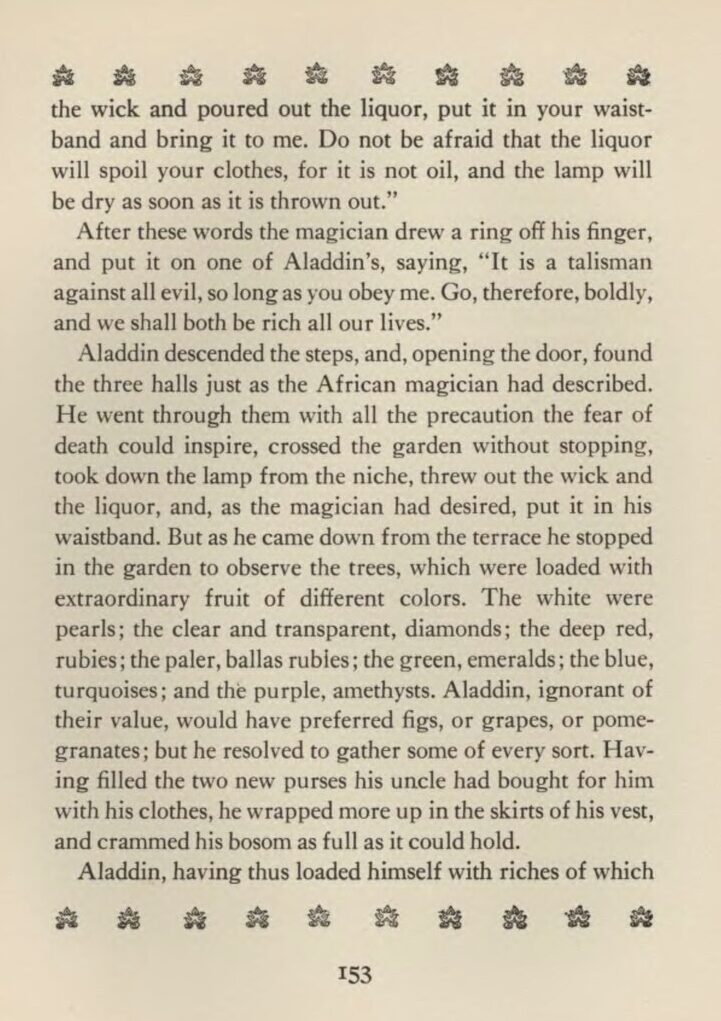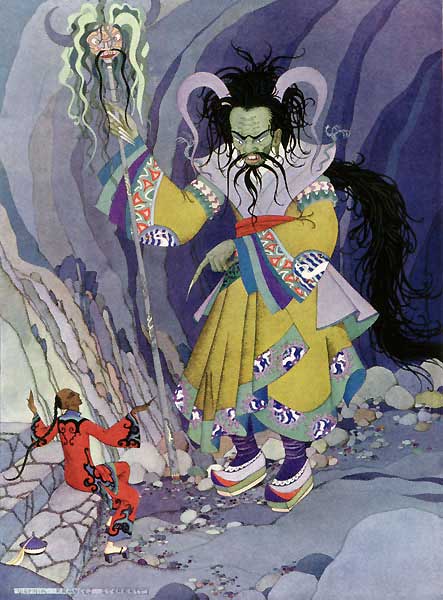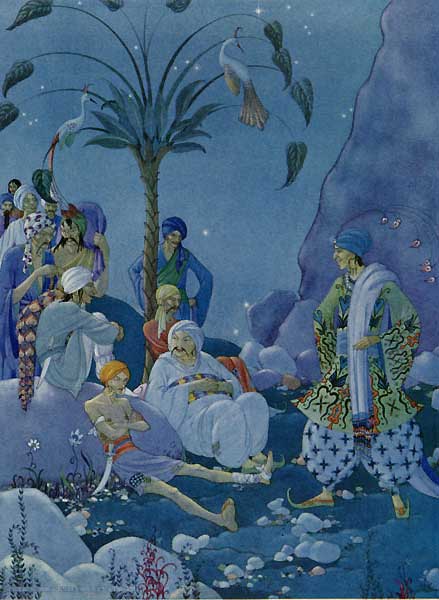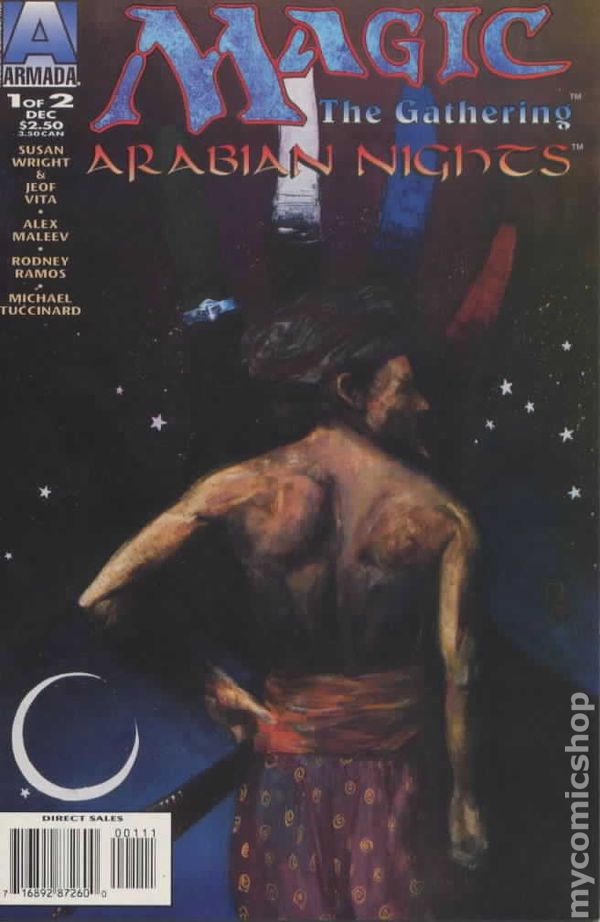Every Real-World Reference in Arabian Nights

We've already gone over all the poetry and prose used on Magic cards from the game's inaugural set in Alpha that eminated from real actual human beings, and you can find that article here.
Today, we're moving onto the next in line chronologically: Magic's very first "expansion," Arabian Nights.
First, I'll give a little recap. Arabian Nights was released in December of 1993, and it was originally intended to be a stand-alone expansion. It would have had a completely different card back separate from the "Deckmaster" back still in use today and totally unique from the game's first release in Alpha/Beta. Obviously that didn't happen, and by scrapping that idea in the 11th hour, Richard Garfield and his design team avoided setting a precedent that likely would have undermined the game's longevity we still enjoy today.
Arabian Nights is one of only two sets in the history of Magic to be directly referential to a real-world setting, with the other being Portal: Three Kingdoms. It has also been reported that all of the flavor text for the entire set was embedded onto the cards over the course of a single evening by then-Head Editor at Wizards of the Coast, Beverly Marshall Saling. So said Mark Rosewater: "In the morning, (Arabian Nights) was being sent to the printer, so (Saling) was doing a final pass on it. It was at that moment that she realized no one had ever chosen any flavor text for the set. She had two different One Thousand and One Nights books at her desk, which she used as the source material. She looked up all the flavor text and put it on the cards all in one night."
That doesn't really answer the why of the set. Of all things, why center Magic's first-ever expansion around One Thousand and One Nights. The simple answer, really, is that they didn't. Not exactly. Richard Garfield around this time was enamored with the comic The Sandman, particularly the story called "Ramadan" in Issue #50. In that story, the King of Baghdad calls upon the Lord of Dreams to freeze the perfect city in time, in order to avoid the decay and degradation inevitably brought about by the passage of time. Long story short, all of Baghdad ends up as a City in a Bottle.
This story rekindled in Garfield a childhood passion for the original One Thousand and One Nights, and after reading that comic he pored himself over dozens of translations and versions and retellings of the original story collection, the result was Arabian Nights the Magic set, born out of a love of Arabian Nights the book.
Due to the nature of the set, we're not going to have as much time or space to delve so deeply into every little wink and nod to our earthly influence. In total, there are 92 cards contained within Arabian Nights, and in name, flavor text or both, nearly all of them have some reference to the One Thousand and One Nights. So let's stop rambling and start getting to the heart of the matter: all the real-world references in Arabian Nights.
Aladdin's Ring
It's fitting that we start the article with a quotation from One Thousand and One Nights, or The Arabian Nights as it's attributed to on Aladdin's Ring. Probably the most famous work of classical Middle Eastern fiction, at least to Western readers, One Thousand and One Nights is a compilation of folk tales centered around the masterful storytelling of Scheherazade.
As the tale goes, there was a king named Shahryar who, after discovering his wife being unfaithful, murdered everyone involved. After this, he went to tell his brother all about these transgressions; his brother was away, however, and at his estate Shahryar found his brother's wife, also being unfaithful. Again, murder. Shahryar, from then on, swore an oath of revenge against all women and devised a plan to marry a virgin every day, then right before the next day's wedding, behead the previous wife.
There was a guy in charge of finding these virgin brides, the Vizier, but eventually he ran out. There was only one left; the Vizier's own daughter, Scheherazade
In order to sate the king's bloodlust and extend her own lifespan, Scheherazade began telling Shahryar a story, the length of which required her to pause in the middle as the next day dawned. Enraptured, the king forestalled the ax in order to hear the story's end; that came on the next evening, followed immediately by the first half of the next story. This pattern continued for -- you guessed it -- 1,001 nights. By the time Scheherazade ran out of stories to tell, the king had forgotten his vow to murder all women, as one does, and instead made Scheherazade his queen. So, a happy ending, if you look at it from Scheherazade's perspective, and not the perspective of the roughly 1,000 women Shahryar had killed up to the point of meeting Scheherazade.
You may read that summary and think "hey, that's not exactly how I learned it in high school." And that very well may be true. One Thousand and One Nights, as a text, is somewhere between 800 and 1,300 years old, and was first translated into English around 1796 CE. Since then, there have been numerous other translations and reinterpretations, each tweaking the finer details of the framing tale of Scheherazade as well as her stories themselves. But largely the broad points remained the same.
"After these words the magician drew a ring off his finger, and put it on one of Aladdin's, saying: 'It is a talisman against all evil, so long as you obey me.'" --The Arabian Nights

This segment, which contains the quote from Aladdin's Ring, is from the tale "The Genie of the Ring." Specifically, from the translation of Arabian Nights illustrated by Virginia Frances Sterrett. That version was published in 1928. Her commissioned work for that edition is considered a masterpiece in illustration, and frankly, would make a killer Secret Lair if they were ever to revisit the plane of Rabiah (which they probably won't, but never say never). According to the Rabiah Scale, linked back there in the last sentence, Rabiah is a "10," meaning, according to Mark Rosewater, "I never say never, but this would require a major miracle."
This isn't relevant to what we're talking about, but if you're curious and don't want to click away because you're so enraptured by this article so far, there are three other planes also considered a 10 on the Rabiah Scale: Bablovia, the setting of Unstable, the unnamed Portal Three Kingdoms plane, and Tolvada, the home of Kaya.
Anyway, back to Aladdin. Here's the illustration by Sterrett that goes along with that particular story:

That doesn't look like Robin Williams at all.
And it shouldn't, since the efreet that comes out of the ring isn't the same as the genie that comes out of the lamp. Aladdin is just lousy with wish-granting demons. Speaking of Aladdin, you may be among the many who have wondered why he looks decidedly Chinese both in the above illustration as well as on the art of his card:
That's because originally, tales featuring Aladdin weren't part of One Thousand and One Nights. Those stories were added much later, as part of a French translation of the book around the early 1700s. Aladdin, as per that translation, is Chinese, and stories concerning him were set in ancient China.
Ali Baba
Everyone knows the quote "Open, Sesame!", probably thanks to Looney Tunes, or Animaniacs, or newer cartoons, depending on how old you are. For reference, here's the quote directly from the card:
"When he reached the entrance of the cavern, he pronounced the words, 'Open, Sesame!'" But here's the thing: these words, as quoted here, are not said by Ali Baba. This sentence is actually about Cassim, Ali Baba's rich and terrible older brother. Ali Baba, a poor woodcutter, by chance overhears a gang of 40 thieves using that magical phrase to open and close the entrance to their cave hideout, in which they've stashed all their ill-gotten gains. Ali Baba does go in, but only takes a tiny amount. When Cassim discovers this, he coerces Ali Baba to reveal the location of the cave and the secret password.
It turns out that if you're a greedy jerk like Cassim, "sesame" is pretty easy to remember when you're going into a secret cave filled with innumerable riches, but it's pretty dang hard to remember when you're trying to leave. Here's the continuation of that quote:
"He quickly entered and had as many bags of gold as he could carry at the door of the cavern, but his thoughts were so full of the great riches he could not think of the necessary word to make it open. Instead of Sesame, he said, 'Open, Barley!' and was much amazed to find that the door remained fast shut. He named several sorts of grain, but still the door would not open."
Cassim's discovered by the 40 thieves and swiftly murdered, his body quartered and displayed as a warning to any other potential interlopers. There's more to the story, notably including a part where Ali Baba's servant-girl kills 37 of the 40 thieves by boiling them with hot oil, one by one. Here's another illustration by Sterrett, as a treat:

To be fair, the card itself doesn't actually attribute this quote to Ali Baba himself, but rather Arabian Nights as a whole. It's just assumed by most that the quote is Ali Baba's, what with the card called "Ali Baba" and all. And he does say "Open, Sesame!" multiple times in the story, but that exact quote is actually Cassim. Pedantic? Definitely.
Army of Allah
Setting aside the obvious reference of Allah in the card's name, its flavor text is attributed to an "Arab proverb." However, there's no evidence that this is actually true. There's anecdotal evidence, sure. Just like it says "Arab proverb" on the card itself, the quote "On the day of victory, no one is tired" is also listed, of all places, in the resolution for Bill 4490 passed by the South Carolina General Assembly's 110th session in late '93 - coincidence? That particular resolution was to extend the assembly's condolences to the family of Bill Edens, who worked in AIDS prevention, and contained this line: "Whereas, Mr. Edens' favorite saying was on a 1988 desk calendar on his desk turned to an Arabic proverb which may best personify his efforts which stated: 'On the day of victory, no one is tired.'"
Further, George H. W. Bush, in a letter of congratulations ot the U.S. Olympic Team in 1992, said: "And you really paved the way magnificently for a knockout punch in Atlanta. I just can't wait until 1996. A proverb says, 'On the day of victory, no one is tired.' Today we celebrate Olympians, like America, who are victorious, refreshed, and free." Note it says simply a proverb, not necessarily an Arabic one.
And not to get too in the weeds here, but the quote is also present in a YA novel called A Dream to Cherish, which is evidently the fourth in the "Cassie Perkins Series." That novel was published in... 1992. This quote, or variations of it, is also attributed in various places to a German proverb, or uttered by Napoleon some time in the early 1800s, to Sun Tzu's Art of War, or to the ancient Japanese, the last of which sees it written as "On the day of victory, no fatigue is felt" on roughly a million t-shirts related to Americanized martial arts.
What am I getting at, here? I don't know exactly, but it's fascinating. No evidence suggests a definitive source, and it rose to prominence, or at least in the zeitgeist of the time, sometime in the early 1990s. It's almost as if someone made it up or bastardized it from some lost source material and stuck it on a poster, tee shirt, or "quote-a-day" calendar where a bunch of people saw it all at once.
If you learn anything from this, it's just to make sure you don't accept the first interpretation of something as fact. To quote our conspiracy theorist uncles, "do your own research!"
Bird Maiden
The first two cards we talked about containing quotes from Arabian Nights were attributed to the "Junior Classics" translation, but here on Bird Maiden, we've switched over to the "Haddawy" translation.
Husain Haddawy translated a version of the text in 1990, based on a 14th-century Syrian manuscript of the source material, and aside from the Junior Classics translation was the other version sitting on Beverly Marshall Saling's desk during that fateful night of furious quoting.
"Four things that never meet do here unite
To shed my blood and to ravage my heart,
A radiant brow and tresses that beguile
And rosy cheeks and a glittering smile." --The Arabian Nights, trans. Haddawy
This quote, from "The Second Dervish's Tale," is the cliffhanger Scheherazade uses to end the 42nd night of her captivity. As for the Bird Maiden herself, she and others of her ilk aren't really featured much in the book, but rather are ancillary characters.
Juzám Djinn
"Expect my visit when the darkness comes. The night I think is best for hiding all." --Ouallada
This is the first quote we've seen that isn't actually from One Thousand and One Nights. It's actually from 11th century Andalusian poet and princess Wallada bint al-Mustakfi, transliterated on the card as Ouallada. Andalusia, if you're wondering, was in this context a Muslim-ruled region in what is now modern-day Spain.
The above quote is just one of many translations of her poetry, which each adjusting word choice depending on the translator. Another version of these lines is:
Wait for me whenever darkness falls,
For night I see contains a secret best.
If the heavens felt this love I feel for you,
The sun would not shine, nor the moon rise,
Nor would the stars launch out upon their journey.
A little different tone than the menace contained within the quote on Juzám Djinn. But don't worry: the full poem takes... a turn.
King Suleiman
This time we're quoting the Quran:
"We made tempestuous winds obedient to Solomon ... And many of the devils We also made obedient to him." --The Qur'an, 21:81
Solomon and Suleiman are the same person, as you probably guessed, just different spellings. Suleiman appears frequently in One Thousand and One Nights, and was a real person; specifically, the seventh Umayyad caliph, who ruled from what is now Syria from 715 to 717.
This particular verse is illustrating Suleiman's dominion over nature, considered a metaphor for his excellent governance. Here's another translation of the same line, since that's been the theme of this article:
"And to Solomon We subjected the raging winds, blowing by his command to the land We had showered with blessings. It is We Who know everything."
Several of the stories feature Suleiman either slaying djinn and efreets, or capturing them in bottles, like this one
In that story, a group of travelers crossing the Sahara stumble upon the ancient lost City of Brass. In the city, the travelers try to recover one of Suleiman's djinn-trap bottles, but are waylaid by all manner of weirdness, including automatons (called Brass Men), a mummy, dancing dolls, and robot spiders. "The City of Brass" is considered one of the first-ever works of science fiction in literature.
Oh, and I threw the Ebony Horse up there because in another story, the Ebony Horse is a mechanical steed that can fly into outer space.
Piety
Another verse from the Quran, this time reading thusly:
"Whoever obeys God and His Prophet, fears God and does his duty to Him, will surely find success." --The Qur'an, 24:52
Pretty apt flavor text for a card called Piety, one must admit. And piety is a central aspect of the vast majority of tales told in One Thousand and One Nights. Again, there are dozens of translations of this line, with another one that sounds like this:
"Whoever obeys God and His Messenger, stands in awe of God, and keeps his duty to Him will be triumphant."
There's not much behind this one, as a card called Piety gets a flavor text that sharpies a big bold underline beneath it.
Repentant Blacksmith
Our last direct quotation comes to us again courtesy of Haddawy:
"For my confession they burned me with fire And found that I was for endurance made." --The Arabian Nights, trans. Haddawy
Pretty self-explanatory, if you don't look into it too much. There's a blacksmith, who may or may not have done something bad and is now repentant. And also he's immune to fire.
But here's a bit from One Thousand and One Nights as a little primer:
"It reached the ears of a certain pious man that there abode in such a town a blacksmith, who could put his hand into the fire and pull out the iron red-hot, without the flames doing him aught of hurt."
This "certain pious man" visited the thick-skinned blacksmith and saw exactly what was reported. No hammer or tongs needed here, just a guy who can grab ahold of all manner of hot stuff. The pious man stayed with the blacksmith for several nights, but never once saw the blacksmith pray or show any reverence at all toward their creator. Surely this gift must be a miracle?
Uh, not exactly. The blacksmith explains that he had a crush on a religious girl in the neighborhood, but his love was unrequited. The girl only had eyes for The Lord. A famine struck, and the blacksmith being a tradesman could afford food that the girl could not. Each night, the blacksmith paraded his dinner in front of the girl and told her she could eat, but only after they took a little sojourn to the blacksmith's private quarters, if you catch my drift.
The girl, firm in her faith, refused each night, until she was almost starved. Fearing she'd succumb to hunger, the blacksmith finally said she could eat without any strings attached, and in her joy called upon God to bestow upon the blacksmith an immunity to fire damage. After it was confirmed to have worked, thanks to an errant coal from the fire, the girl promptly died. So, happy ending?
Feel free to share that story if you ever see anyone play Repentant Blacksmith.
When one wolf calls, others follow
Every card in Arabian Nights is in some way tied to our real world, and it would be a testament to endurance to cover each one in equal detail.
However, I don't think you need me to ramble about how there are Pyramids
If you do want more background, however, you could always read this book -- you may have heard of it -- called One Thousand and One Nights. And if you care more about Magic's interpretation of Scheherazade's tales, you could always scour eBay for the comic books.

I'll catch you later, for the first in what will probably end up being multiple entries devoted strictly to Legends and that set's 50 or so real-world references.